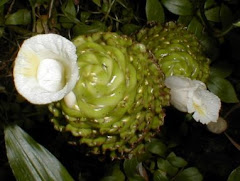Succulent - water-retaining
Laxatives (or purgatives) - foods, compounds, or drugs taken to induce bowel movements or to loosen the stools, most often taken to treat constipation
Resinous - any of numerous clear to translucent yellow or brown, solid or semisolid viscous substances of plant
Exudates - any substance that oozes out from the pores of diseased or injured plant tissue. Resins, gums, oils and lacquers are examples of exudates widely
extracted for industrial uses
Salve - medical ointment used to soothe the head or other body surface
Topical - applied to body surfaces
Offsets - layers of plants
Lanceolate - long, wider in the middle
Serrated - saw-toothed margins
Pendulous - blooms borne on erect, branched flower stems
Corolla - collective term for petals of a flower taken as a group within the calyx
Chlorenchyma - parenchyma with chloroplasts
Mesophyll - tissue between the upper and lower epidermis of a leaf blade (lamina) consisting of parenchyma-like cells containing numerous chloroplasts.
Vascular bundles - part of the transport system in vascular plants
Bundle sheath - thick-walled plant cell surrounding veins that functions in C4 photosynthesis
Phloem - outer layer of the stem underneath the bark that carries organic nutrients (known as photosyntate), particularly sucrose, a sugar, to all parts of the plant where needed
Putative - suppose
Immunomodulatory - having the ability to alter or regulate one or more immune functions
Sludge blood - sticky substance in the blood covered the dying cells, they formed into clusters
Crohn's disease - inflammatory disease of the digestive system which may affect any part of the gastrointestinal tract from the mouth to the anus
Celiac disease - autoimmune disorder of the small intestine that occurs in genetically predisposed people of all ages
Acid reflux - chronic symptoms or mucosal damage produced by the abnormal reflux in the esophagus
Phytonutrient - plant-derived chemical compounds under scientific research for their potential health promoting- properties
Systemic lupus - autoimmune disease characterized by acute and chronic inflammation of various tissues of the body
Erythematosus - connective tissue disease
Unpalatable - not pleasing to the taste
Canker sores - shallow, painful sores in the mouth. They are usually red or may sometimes have a white coating over them
Ulcerative colitis - disease that causes inflammation and sores, called ulcers, in the lining of the rectum and colon
Mucositis - painful inflammation and ulceration of the mucous membranes lining the digestive tract usually as an adverse effect of chemotherapy and radiotherapy treatment for cancer
Phototoxicity - chemical compound which becomes toxic only when exposed to light
Nausea - sensation of unease and discomfort in the stomach with an urge to vomit
Colic - form of pain in the abdomen which starts and stops abruptly
Sedative - substance that induces sedation by reducing irritability or excite
Antipyretic - drugs that reduce body temperature in situations such as fever. However, they will not affect the normal body temperature if one does not have a fever
Motion sickness - condition in which a disagreement exists between visually perceived movement and the vestibular system's sense of movement. Depending on the cause it can also be referred to as seasickness, carsickness, simulation sickness, airsickness, or space sickness
Carminative - prevents formation of gas in the gastrointestinal tract, or facilitates the expulsion of said gas, thereby combating flatulence
Pungent - sharp and biting sensory impression. Food that causes this sensation is often called "spicy"
Dyspepsia - the impairment of the power of function of digestion, usually applied to epigastric discomfort following meals
Atonic dyspepsia - dyspepsia with impaired tone in the muscular walls of the stomach
Subscribe to:
Post Comments (Atom)































































No comments:
Post a Comment